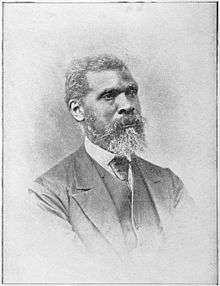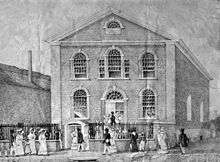John C. Bowers
| John C. Bowers | |
|---|---|
 | |
| Born |
February 9, 1811 Philadelphia, Pennsylvania |
| Died |
October 5, 1873 (aged 62) Philadelphia, Pennsylvania |
| Resting place | Eden Cemetery, Collingdale, Pennsylvania |
| Ethnicity | African American |
| Occupation | Entrepreneur, organist, vestryman |
| Organization | St. Thomas African Episcopal Church, |
| Movement | Colored Conventions Movement |
| Religion | Episcopalian |
| Spouse(s) | Mary C. Collins |
| Parent(s) | John and Henrietta Bowers |
| Relatives |
Sarah Sedgwick Bowers (sister) Thomas Bowers (brother) |
John C. Bowers (February 9, 1811 – October 5, 1873) was an African American entrepreneur, organist and vestryman at St. Thomas African Episcopal Church, and a founding member of the first Grand United Order of Odd Fellows for African Americans in Pennsylvania.[1][2] He was active in the anti-slavery movement in Philadelphia, and involved in the founding of several organizations including the Pennsylvania Anti-Slavery Society.[3]:154 "A fervent abolitionist and outspoken opponent of colonization, [he] was much in demand as a public speaker."[3]:153–154
Early life and career
John C. Bowers was born in Philadelphia, Pennsylvania to John and Henrietta Bowers.[3]:153 His father, John C. Bowers, Sr. (1773–1844), was a secondhand clothing dealer, a vestryman and school trustee at St. Thomas African Episcopal Church, and one of the founders of the Pennsylvania Anti-Slavery Society.[3]:133[4]

The younger Bowers was also a member of St. Thomas African Episcopal Church,[5]:113 where he became the organist.[5]:114[6] Two of his siblings pursued singing careers. Bowers trained his brother, Thomas Bowers, in the piano and organ;[6] eventually his brother pursued voice training with famed African American concert artist Elizabeth Taylor Greenfield, and embarked on a solo career as a concert tenor.[7][8] Their sister Sarah Sedgwick Bowers studied as a concert soprano and toured professionally in 1856.[6]:21
John C. Bowers trained as a tailor and became the proprietor of a clothing shop at No. 71 South Second Street, Philadelphia.[9]:25 Martin Delany describes him as the owner of a "fashionable merchant tailor shop" together with his brother, Thomas, catering to upper class gentlemen and businessmen in Philadelphia,[10] while Henry M. Minton characterizes him as "the most prominent" of 15 tailors in the city.[11]
Community activism
Bowers was a member of several literary societies.[12] He was one of the signatories of the constitution of the Philadelphia Library Company of Colored Persons, instituted on January 1, 1833. The Company's object was "the collection of a library of useful works of every description, for the benefit of its members, who might there successfully apply without comparatively any cost, for that mental good which they could not readily obtain elsewhere". For a membership fee of $1, African Americans of all classes were afforded an opportunity to further educate themselves. The library's members adopted a system of organized reading and weekly debate that enabled its members to practice elocution and public speaking.[13]:96–100 In spite of its name, the Library Company was a male institution.[14] Bowers also supported the education of women, writing to the Liberator in 1834 in praise of women's literary groups.[14] Bowers was involved in starting the Gilbert Lyceum, instituted on January 31, 1841, which enabled women and men to work together in literary and scientific pursuits.[13]:109–111 He became secretary of the weekly newspaper The Colored American in 1841.
As a member of the Library Association of Philadelphia, he was a delegate to the first meeting of the American Moral Reform Society in 1837,[15]:224–225 where he gave a speech on temperance.[3]:154 The society's platform included "Education, Temperance, Economy and Universal Liberty".[16] Bowers was also a member of the Association for Moral and Mental Improvement.[3]:154
When the Pennsylvania Constitutional Convention of 1838 (known as the Reform Convention) met to amend the state constitution to restrict suffrage to whites, blacks formed their own Committee to respond. J. C. Bowers was one of that committee, along with Robert Purvis, James Cornish, Robert B. Forten, J. J. G. Bias, James Needham, and John P. Burr. They prepared and published the "Appeal of Forty Thousand Citizens Threatened with Disenfranchisement, To the People of Pennsylvania", hoping to convince white citizens not to approve the amended constitution. Bowers was active in raising money for the publication.[3]:154 In spite of their efforts, the citizens of Pennsylvania ratified the new state constitution on October 9, 1838, disenfranchising free African Americans in Pennsylvania. The franchise was not regained until the 15th Amendment was passed in 1869.[3][17][18] During that time, Bowers continued to lobby for African American suffrage.[3]:154
He was a vocal opponent of the American Colonization Society, which promoted the idea that free blacks should leave the United States and emigrate to Liberia.[14] In 1855 he was a delegate to the Colored National Convention, and in 1865 he was elected president of the Colored People's Union League of Philadelphia. In 1865, he also joined the Pennsylvania State Equal Rights League.[3]:154 He encouraged the enlistment of black soldiers in the Union Army; a September 12, 1863, article in The Weekly Anglo-African noted that he was one of those who "presented the regimental colors to the Sixth United States Colored Troop", and afterwards spoke to them, praising the courage of black troops in the war effort.[19]
Bowers was concerned with institutions for mutual relief, and helped to compile and publish a list of aid societies for African Americans in 1831.[20] Bowers was a founding member of Unity Lodge No. 711, the first lodge of the Grand United Order of Odd Fellows to be established in Pennsylvania for African Americans, on June 5, 1845.[1][21]:64 The Odd Fellows provided mutual aid, similar to insurance, with practical benefits for events such as illness, death, disability, and widowhood.[22] Bowers was involved in this "friendly society" for African Americans throughout the rest of his life. He served repeatedly as a Director, for three terms as Deputy Grand Master (1855, 1857, 1858), and for one term as Grand Master (1870).[21]:234
In an obituary for Bowers, The Philadelphia Inquirer wrote: "he was an active and enterprising citizen, warmly interested in all plans for the advancement of his people, prominent in his hostility to slavery."[2] His death was also reported in San Francisco's Pacific Appeal, an African American newspaper that spoke of him as "one of the very best representative colored men that Philadelphia could boast of."[1]
Personal
In 1835 John C. Bowers married Mary C. Collins, daughter of Cato Collins.[12]:110 She taught Sunday school in the church.[12] She died a year after their marriage.[3]:153–154
Bowers died in 1873 and was buried in Lebanon Cemetery in Philadelphia.[23] In 1903, his remains and those of others were moved to Eden Cemetery in Collingdale, Delaware County, Pennsylvania – the oldest public African American burial ground in the United States.[24] Burials from Lebanon and other cemeteries were moved because of construction projects within the city of Philadelphia.[24]
References
- 1 2 3 "Philadelphia: Death of P. G. M., J. C. Bowers". Pacific Appeal X (11) (San Francisco, California). 8 November 1873. Retrieved 3 May 2014.
- 1 2 "Obituary". Philadelphia Inquirer. 1873-10-08.
- 1 2 3 4 5 6 7 8 9 10 11 Winch, Julie (2000). The Elite of Our People: Joseph Willson's Sketches of Black Upper-Class Life in Antebellum Philadelphia. Pennsylvania State University. ISBN 0271020202.
- ↑ Foner, Philip Sheldon (1983). History of Black Americans: From the emergence of the cotton kingdom to the eve of the compromise of 1850. Greenwood Press. p. 310. ISBN 0837175291.
- 1 2 Jackson, Irene V. (1985). More Than Dancing: Essays on Afro-American Music and Musicians. Greenwood Press. ISBN 0313245541.
- 1 2 3 Nettles, Darryl Glenn (2003). African American concert singers before 1950. Jefferson, NC: McFarland. ISBN 0786414677.
- ↑ Trotter, James M. (1881). "Music and Some Highly Musical People". readcentral.com. Retrieved 3 May 2014.
|chapter=ignored (help) - ↑ Appiah, Kwame Anthony; Gates, Jr., Henry Louis (2005). Africana: The Encyclopedia of the African and African American Experience. Oxford University Press. p. 598. ISBN 0195170555.
- ↑ M'Elroy, A. (1839). A. M'Elroy's Philadelphia Directory. Philadelphia: A. McElroy & Co.
- ↑ Delany, Martin Robison (2012). The Condition, Elevation, Emigration, and Destiny of the Colored People of the United States. Tredition. ISBN 3847207970.
- ↑ Minton, Henry M. (1913). Early History of Negroes in Business in Philadelphia. Historical Society of Pennsylvania.
- 1 2 3 Yellin, Jean Fagan; Van Horne, John C. (1994). The Abolitionist Sisterhood: Women's Political Culture in Antebellum America. Cornell University Press. ISBN 0801480116.
- 1 2 Willson, Joseph (1841). Sketches of the Higher Classes of Colored Society in Philadelphia. Philadelphia: Merrihew and Thompson, Printers. ISBN 0-271-02021-0.
- 1 2 3 "You have talents – only cultivate them", Philadelphia's Black Female Literary Societies and the Abolitionist Crusade in Winch, Julie; editors, John C. Van Horne, (1994). Yellin, Jean Fagan, ed. The Abolitionist sisterhood: women's political culture in Antebellum America. Ithaca: Cornell University Press. ISBN 0801480116. Cite uses deprecated parameter
|coauthors=(help) - ↑ Porter, Dorothy (1995). Early Negro Writing, 1760-1837 (Revised ed.). Black Classic Press. ISBN 0933121598.
- ↑ Horton, James Oliver; Horton, Lois E. (1998). In hope of liberty culture, community, and protest among northern free Blacks, 1700-1860 (Reprint ed.). New York: Oxford University Press. p. 221. ISBN 0195124650.
- ↑ Purvis, Robert (1838). Appeal of Forty Thousand Citizens, Threatened with Disfranchisement, to the People of Pennsylvania. Philadelphia: Preserving American Freedom.
- ↑ Dorsey, Bruce (2006). Reforming men and women: Gender in the antebellum city. Ithaca, N.Y.: Cornell University Press. p. 151. ISBN 0801472881.
- ↑ Jackson, Maurice; Bacon, Jacqueline (2013). African Americans and the Haitian Revolution: Selected Essays and Historical Documents. Routledge. pp. 112–113. ISBN 1134726066.
- ↑ "Institutions for Mutual Relief" (PDF). National Humanities Center Resource Toolbox The Making of African American Identity I. 1831. Retrieved 4 May 2014.
- 1 2 Brooks, Charles H. (1902). The Official History and Manual of the Grand United Order of Odd Fellows in America: A Chronological Treatise. Odd Fellows' Journal Print.
- ↑ Barga, Michael. "Grand United Order of Odd Fellows in America". Social Welfare History Project. Retrieved 4 May 2014.
- ↑ "John C. Bowers". Find A Grave. Retrieved 2 May 2014.
- 1 2 Mengers, Patti (14 November 2010). "Collingdale's Eden Cemetery is oldest African-American burial ground in U.S. (With Video)". Daily Times News.